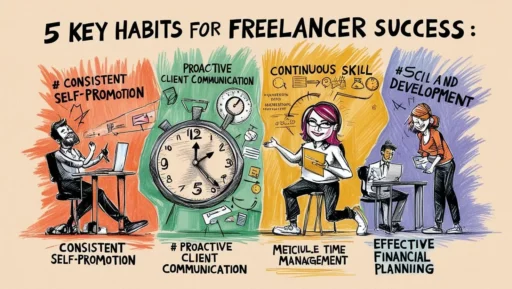The freelance dream is often painted with broad strokes of freedom, flexibility, and passion-fueled work. The reality, however, is that this freedom is a double-edged sword. Without the structure of a traditional job, success or failure rests entirely on your shoulders. It’s here, in the day-to-day operations of your one-person business, that a secret weapon emerges: habits.
Consistent success as a freelancer goes far beyond raw talent, sophisticated tools, or even a strong client list. It thrives on the foundation of powerful, sustainable habits. With the autonomy of self-employment comes immense responsibility. Your ability to design and stick to positive routines directly determines your productivity, financial health, professional reputation, and personal well-being. Ultimately, your habits dictate the longevity and profitability of your freelance career.
Adopting the right systems ensures you don’t just survive the “feast or famine” cycle—you thrive in spite of it. These five crucial habits are what separate the freelancers who flourish long-term from those who burn out.
1. Become the Master of Your Own Time
Why It Matters: As a freelancer, you have no boss setting your hours or policing your to-do list. This complete control is liberating but also dangerous. Without discipline, it’s easy for the lines between work and rest to blur, leading to missed deadlines, frazzled nerves, and the chronic stress of feeling perpetually “on.” You must become your own, highly effective manager.
How to Establish This Habit:
- Plan Your Week Before It Starts: Don’t wake up on Monday morning and wonder what to do. Spend 30 minutes on Friday afternoon or Sunday evening to review your commitments and set your top 3-5 priorities for the upcoming week. This provides immediate clarity and direction.
- Embrace Time Blocking: Instead of a simple to-do list, schedule blocks of time in your calendar for specific tasks. Allocate distinct blocks for “deep work” (focused, creative tasks), “shallow work” (emails, admin), and client meetings. This protects your most productive hours from distractions.
- Set and Defend Your Office Hours: Create defined start and finish times for your workday and communicate them to your clients. A simple line in your email signature like, “My office hours are 9 AM to 5 PM, Monday-Friday,” sets a professional boundary. Use an email autoresponder outside of these hours to reinforce this structure and protect your personal time.
- Implement a “Shutdown Ritual”: At the end of your day, create a routine that signals your brain it’s time to stop working. This could be as simple as clearing your desk, reviewing your accomplishments, making a to-do list for tomorrow, and physically closing your laptop. This ritual creates a powerful psychological barrier against late-night work creep.
2. Commit to Being a Lifelong Learner
Why It Matters: The industries freelancers serve are in a constant state of flux. Tools evolve, algorithms change, and client needs shift. The skills that are valuable today may become obsolete tomorrow. Stagnation is the silent killer of a freelance career. Lifelong learners not only stay relevant but also command higher rates, identify new opportunities, and can pivot smoothly when markets change.
How to Establish This Habit:
- Schedule Learning Time: Treat your self-development with the same importance as a client deadline. Block out at least one or two hours in your calendar each week specifically for learning. This could be for taking an online course, watching a webinar, or reading industry publications.
- Create a “Learning Stack”: Build a personalized curriculum from diverse sources. Listen to industry podcasts during your commute or while doing chores, read books from leaders in your field, and follow experts on social media.
- Learn by Doing (and Teaching): The best way to solidify a new skill is to apply it. Take on a “stretch project” that pushes you just outside your comfort zone. Once you’ve learned something new, try to teach it by writing a blog post or explaining it to a peer. This reinforces your understanding and builds your authority.
3. Practice Proactive and Empathetic Communication
Why It Matters: Exceptional work can be completely undermined by poor communication. From a client’s perspective, silence is terrifying; it’s often interpreted as a lack of progress or a hidden problem. Clear, consistent, and proactive communication builds trust, prevents misunderstandings, and is the number one reason clients provide repeat business and referrals.
How to Establish This Habit:
- Master the Kickoff Call: Start every new project with a thorough kickoff meeting. Use this time to align on goals, deliverables, timelines, and, most importantly, communication protocols. Agree on preferred channels (e.g., email for official records, Slack for quick questions) and the frequency of updates.
- Send a Weekly Summary Email: Every Friday, send a brief, structured email to your clients. A simple format works wonders: 1) Here’s what was accomplished this week. 2) Here’s the plan for next week. 3) Here are any questions I have for you. This five-minute task can eliminate days of client anxiety.
- Over-communicate Good News and Bad News: It’s easy to share progress, but it’s vital to communicate setbacks early. If you’re running behind schedule, inform the client immediately and present a solution. This transparency builds far more trust than hiding a problem.
4. Treat Your Finances Like a Business
Why It Matters: The “feast or famine” cycle is a real and stressful part of freelance life. Financial discipline is the only way to smooth out the inevitable fluctuations in income. Without an employer managing payroll and taxes, you must become your own Chief Financial Officer (CFO).
How to Establish This Habit:
- Open Separate Bank Accounts: At a minimum, have one account for business income/expenses and another for personal use. To level up, create a third account specifically for taxes.
- Automate Your Savings: Adopt a system like “Profit First.” The moment a client payment hits your account, immediately transfer fixed percentages to other accounts. For example: 30% to Taxes, 15% to Savings/Profit, and the remaining 55% to your Operating/Salary account. This ensures you always have money set aside for taxes and a buffer for slow months.
- Invoice Promptly and Follow Up Systematically: Send your invoice as soon as the work is complete or a milestone is met. Use accounting software (like FreshBooks or Wave) to automate reminders for overdue payments. Chasing money is a part of the job; systematize it so it’s less emotional.
5. Prioritize Your Well-being to Prevent Burnout
Why It Matters: “Hustle culture” has glorified burnout as a badge of honor. This is a dangerous lie. Your creativity, problem-solving ability, and overall work quality are directly tied to your mental and physical health. Self-care is not an indulgence; it is a core business strategy for long-term high performance.
How to Establish This Habit:
- Schedule Downtime First: Put your personal appointments, workouts, and days off in your calendar before you fill it with work. Treat a gym session or a lunch break with the same respect you would a client meeting.
- Move Your Body: Avoid being chained to your desk. Incorporate short walks, stretching, or a brief workout into your daily routine. Physical activity is proven to boost mood and cognitive function.
- Actively Combat Isolation: Freelancing can be lonely. Make a conscious effort to connect with others. Join a freelancer community on Slack or Discord, schedule virtual coffee chats with peers, or work from a local coffee shop or coworking space once a week.
Conclusion: Your Habits Are Your Foundation
Success in freelancing is rarely the result of a single grand gesture. It is the cumulative product of small, daily habits that build on each other over time. When you combine masterful time management, a commitment to learning, proactive communication, financial discipline, and dedicated self-care, you create an unbreakable foundation for your business. With this foundation in place, you are free to do your best creative work, not just for a few months, but for a long, prosperous career.
“Beyond habits, it’s about developing the right skills to thrive in the freelance world.”

